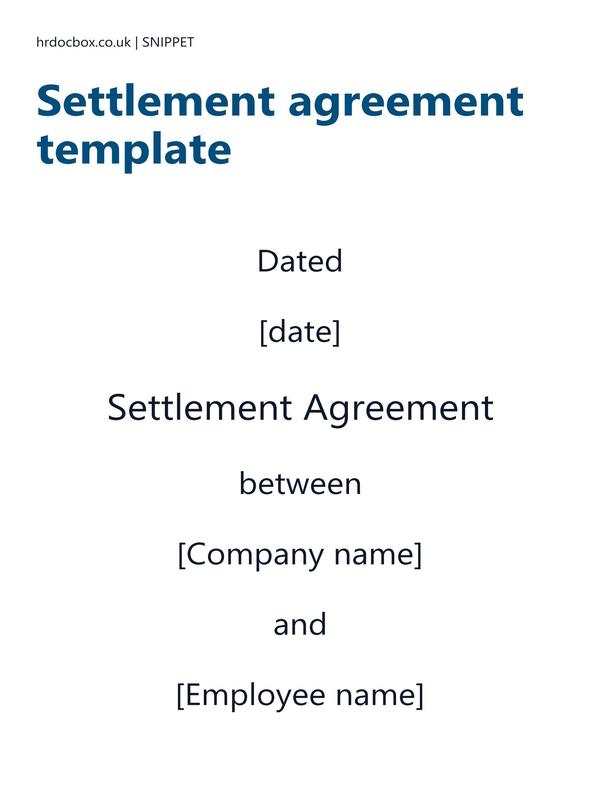Settlement agreement template


Our Settlement Agreement Template facilitates fair and clear resolution, easing legal processes for both parties involved in employment separation.
- Includes Settlement agreement template, plus 12 months’ access with all updates provided free of charge and notified to you.
- UK-specific accuracy.
- 4,962 words over 11 pages.
- Last updated 15/10/2025.
- Format: Word / plain text / email.
- Delivery: Instant download after purchase (no physical item).
- Access: Download link shown here after checkout.
- This Settlement agreement template will SAVE you up to 3 hours drafting & research. Save cost. Reduce risk.
Dated
[date]
Settlement Agreement
between
[Company name]
and
[Employee name]
THIS AGREEMENT is dated [date]
Parties
-
[Company name] Limited incorporated and registered in England and Wales with company number [Company registration number] whose registered office is at [Registered Company address] (Company).
-
[Employee name] of [Employee address] (Employee).
Background
The Employee is employed by the Company from [start date], most recently as [job title] under a contract dated [contract date].
-
The Employee's employment with the Company shall terminate on [date].
-
The parties have entered into this agreement to record and implement the terms on which they have agreed to settle any claims that the Employee has or may have in connection with [his | her] employment or its termination or otherwise against the Company (as defined below) or its officers or employees whether or not those claims are, or could be, in the contemplation of the parties at the time of signing this agreement, and including, in particular, the statutory complaints that the Employee raises in this agreement.
-
The parties intend this agreement to be an effective waiver of any such claims and to satisfy the conditions relating to settlement agreements in the relevant legislation
Agreed terms
1. Interpretation
The following definitions and rules of interpretation apply in this agreement.
1.1 Definitions:
Adviser: [ ] of [ ] .
Board: the board of directors of the Company (including any committee of the board duly appointed by it).
Confidential Information: information in whatever form (including, without limitation, in written, oral, visual or electronic form or on any magnetic or optical disk or memory and wherever located) relating to the business, products, affairs and finances of the Company for the time being confidential to the Company and trade secrets including, without limitation, technical data and know-how relating to the business of the Company or any of its suppliers, clients, customers, agents, distributors, shareholders or management, including (but not limited to) information that the Employee created, developed, received or obtained in connection with their employment, whether or not such information (if in anything other than oral form) is marked confidential.
Copies: copies or records of any Confidential Information in whatever form (including, without limitation, in written, oral, visual or electronic form or on any magnetic or optical disk or memory and wherever located) including, without limitation, extracts, analysis, studies, plans, compilations or any other way of representing or recording and recalling information which contains, reflects or is derived or generated from Confidential Information.
Group Company: the Company, its subsidiaries or holding companies from time to time and any subsidiary of any holding company from time to time.
1.2 The headings in this agreement are inserted for convenience only and shall not affect its construction.
1.3 A reference to a particular law is a reference to it as it is in force for the time being taking account of any
This is a 10% preview of the Settlement agreement template. For instant full access, purchase this item or a parent bundle.
Settlement agreement template purpose
A settlement agreement, also known as a compromise agreement, is a legal contract between an employer and an employee in the UK. The purpose of the settlement agreement is to resolve any potential or actual disputes between the parties and prevent the employee from pursuing any claims against the employer in an employment tribunal or court.
The settlement agreement usually includes terms relating to the employee's departure from the company, such as the amount of any severance pay, notice period, holiday pay, and outstanding bonuses. It may also include clauses that restrict the employee from disclosing confidential information or competing with the employer in the future.
Settlement agreements are commonly used in situations such as redundancy, unfair dismissal, discrimination, or whistleblowing claims, where there is a potential dispute between the employer and the employee. By signing the agreement, both parties can avoid the cost and uncertainty of legal proceedings and move on with their respective lives.
Practical application of a Settlement agreement template
- The Settlement agreement template should be actioned / delivered once the employee has indiacted that they are willing to accept an offer.
- It is sent / delivered by an employer / HR team to an employee.
Compliance
Compliance
This Settlement agreement template incorporates relevant UK laws and HR standards, including those listed below:
-
Employment Rights Act 1996: Provides the statutory framework regulating the use and validity of settlement agreements in employment disputes.
-
Equality Act 2010: Ensures settlement agreements do not breach anti-discrimination laws and uphold fairness and equality.
-
The ACAS Code of Practice on Settlement Agreements: Provides guidance on the use and drafting of settlement agreements, promoting fair and effective resolution of employment disputes.
-
Data Protection Act 2018 (incorporating GDPR): Mandates that the handling of personal data within settlement agreements adheres to data protection principles.
-
Common Law Principles: Legal principles and case law guide the formation and interpretation of settlement agreements.
The law requires that the employee must receive independent legal advice from an independent adviser before signing the settlement agreement, so you should provide the employee with a list of qualified advisers that they can choose from. You should also ensure that the agreement specifies the particular claims or complaints that it relates to and that it identifies the adviser who has provided the employee with legal advice.
It is important to ensure that the terms of the settlement agreement are fair and reasonable in light of the employee's circumstances. The agreement should specify the amount of any compensation to be paid, the notice period, and any other terms that are relevant to the employee's departure from the company. Any clauses that restrict the employee's future employment opportunities or ability to pursue claims in the future should be carefully drafted to ensure that they are enforceable and do not breach any legal requirements.
To be valid, a settlement agreement must meet certain legal requirements. For example, the employee must receive independent legal advice before signing the agreement, and the agreement must be in writing and specify the claims that the employee is giving up.
You should also ensure that the settlement agreement is in writing and signed by both parties. You should keep a copy of the agreement for your records, and you should make sure that the employee receives a copy of the agreement and a notice that the agreement satisfies the legal requirements set out in the Employment Rights Act 1996.
Settlement agreement workflow
Settlement agreement workflow
Check which resources should be implemeted before and/or after the Settlement agreement template, to understand the workflow.
Settlement agreement cover letter
Use this model letter when you have reached a settlement agreement with an employee who will be leaving your employment as a result, to enclose the settlement agreement.
Timings
Timings
Follow these best practice actions to get the most from the Settlement agreement template, guiding you before, during, and after implementation:
Instantly unlock with a purchase.
Instantly unlock with a purchase.
| Step | Description | Responsibility | Timing |
| 1 | Identify circumstances where a mutual agreement to end employment is appropriate (e.g., ongoing dispute, breakdown in relationship, redundancy alternative). | HR / Senior Manager | As soon as suitability for settlement is identified |
| 2 | Draft a Settlement Agreement outlining the proposed termination terms, including financial compensation, confidentiality, and waiver of claims. | HR / Legal | Within 2–3 working days of decision |
| 3 | Arrange a protected conversation with the employee to present the draft agreement and explain their right to independent legal advice. | Line Manager / HR | 1–2 working days after agreement is drafted |
| 4 | Allow the employee reasonable time (usually at least 10 calendar days) to review the agreement and seek legal advice before signing. | Employee | Minimum 10 calendar days |
| 5 | Finalise and sign the agreement. Arrange payment of settlement sum and carry out any agreed exit actions. Store agreement securely. | HR / Payroll | Within 5 working days of signing |
Frequently Asked Questions about a Settlement agreement template
Frequently Asked Questions about a Settlement agreement template
-
Can I use the Settlement agreement template in my small business?
Yes. The Settlement agreement template is designed to be flexible and suitable for organisations of all sizes, including small businesses and charities. It follows UK employment law best practice, so even if you don't have an in-house HR team, you can confidently apply it.
-
Is the Settlement agreement template compliant with 2026 UK employment law?
Absolutely. Like the Settlement agreement template, all of our templates are drafted with the latest ACAS guidance and UK employment legislation in mind. We review and update them regularly, so you can be confident they remain compliant.
-
Can I customise the Settlement agreement template for my organisation?
Yes, we highlight the areas of the Settlement agreement template that you need to update with your own details, and where you need to make decisions to suit your situation. This saves you time and ensures that you meet best practice.
-
Do I get instant access to the Settlement agreement template?
Yes. Once purchased, you'll be able to download the Settlement agreement template instantly. Templates are provided in editable Word or Excel format so you can customise them easily, and in PDF format for easy sharing.
-
What if I need more help, not just a Settlement agreement template?
If you're looking for broader support, we also offer toolkits and library bundles that include the Settlement agreement template, along with other HR templates and policies for fully managing your situation. These may be more cost-effective if you need deeper advice.
-
Why should I use this Settlement agreement template, and not AI to generate it?
The risk of using a free AI-generated template 'without review' includes your legal exposure, missing context, and no awareness of the wider process, whereas purchasing the Settlement agreement template from us mitigates that risk.
